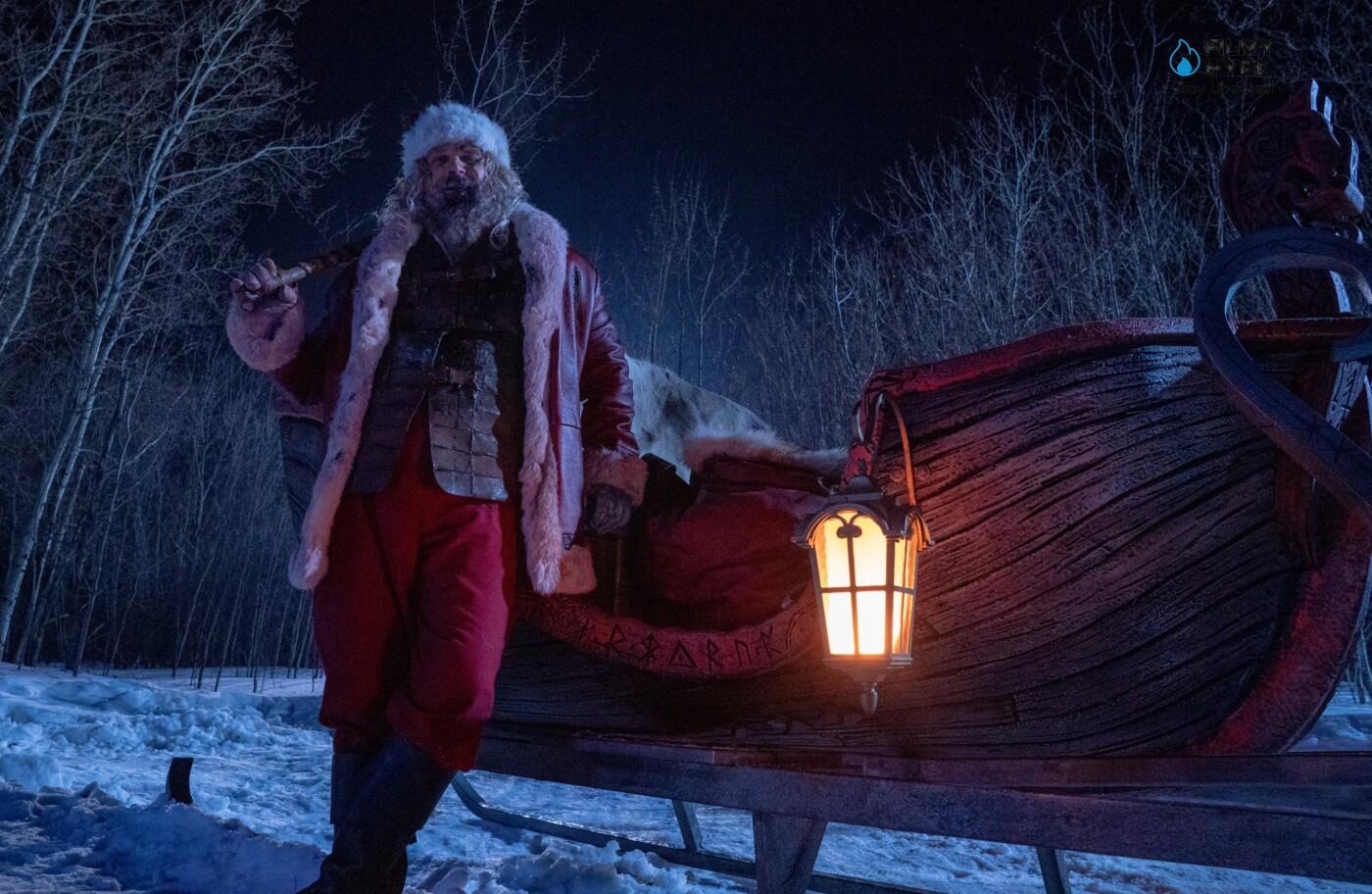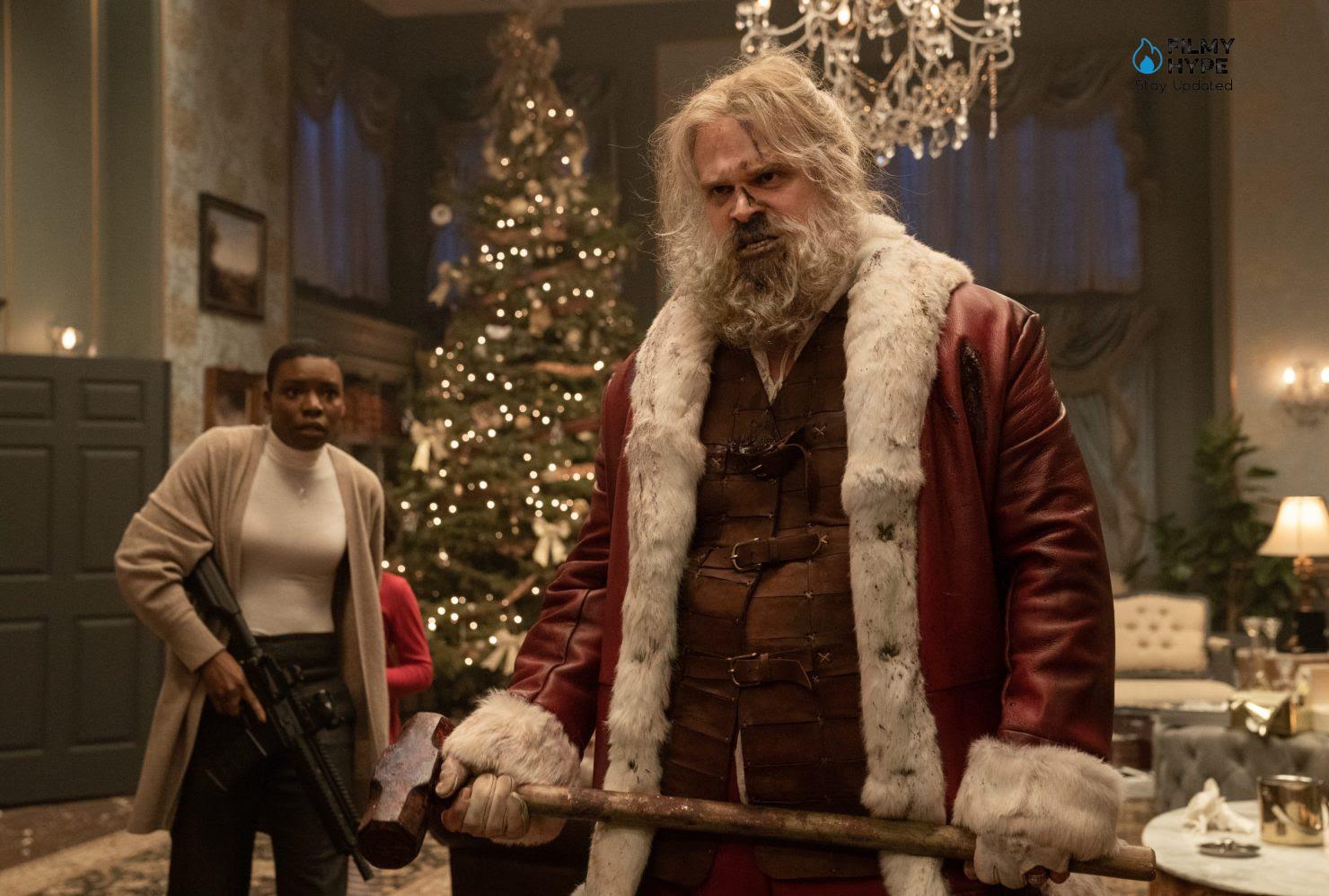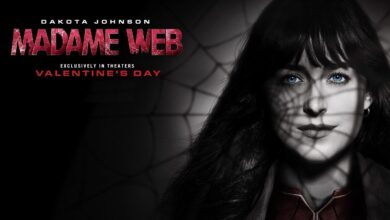Violent Night Review: Irreverent Christmas Action with David Harbor in the Role of Santa Claus
Cast: David Harbour, John Leguizamo, Beverly D’Angelo, Alex Hassell, Cam Gigandet, Edi Patterson, Brendan Fletcher, Alexis Louder, Leah Brady, André Eriksen
Director: Tommy Wirkola
Filmyhype.com Ratings: 4/5 (four stars)
There’s an aspect of our relationship with Santa that we’ve always taken for granted and maybe it’s time to make amends. Violent Night will take care of it to remind us, as well as fill in the blanks and do justice to certain dark pages in the life of a character we thought we knew everything about. Instead, it turns out that we didn’t know a damn thing, but after all, that’s what a good story is for. Alcohol, laughter and smashed bodies. If that’s the formula, long live the new spirit of Christmas.

Values that are completely unrelated to this film directed by Tommy Wirkola, the Norwegian director who became famous for giving birth to zombie Nazis in Dead Snow. The night during which this film takes place is anything but a peaceful night because after all, evil does not give a break-even at Christmas. And so when a group of criminals, led by a leader with the eloquent code name of Mr. Scrooge (John Leguizamo), breaks into the home of the conflicted Lighstone family, Santa Claus (David Harbour) will find himself having to give life to a lot of healthy violence, perhaps rediscovering the joy towards his now hated job.
Violent Night Review: The Story
A man dressed as Santa takes a breather in an English pub, lamenting how today’s consumerist mentality has poisoned the spirits of children. And he is not a simple man hired to meet children in supermarkets; he is the real Santa Claus, now disillusioned and ready to hang up the bag of gifts. Except that while he is listlessly delivering presents in a luxurious Connecticut mansion, thieves break in and scare away the reindeer, leaving ours locked up in the home of a wealthy American family. By chance, he comes into contact with little Trudy, who asks her if she can help. And he, who hasn’t always been a shin of a saint, finds his old grit again when he discovers that thieves are all on the list of naughty men…
Violent Night Review and Analysis
Playing this somewhat scruffy Santa Claus is David Harbour, now comfortable with characters who have anti-heroic attitudes and a penchant for alcohol. The matriarch of the family taken hostage is Beverly D’Angelo, an obvious reference to National Lampoon’s Christmas Vacation, while among the sons and genders Alex Hassell, known for his brief appearance in the series The Boys, and Cam Gigandet appear. The main villain, who calls himself Scrooge-like the Dickensian character, has the features of John Leguizamo, and in his gang, as per tradition in Wirkola’s films, there is a Scandinavian presence, the Norwegian character actor André Eriksen, also known as a rapper.
It is not the first time that American cinema has tried to reinvent Christmas traditions in a slightly darker, and not it’s not even the first time for Universal, which released Krampus a few years ago (to which this film alludes via the codename of one of the antagonists). The difference, in this round, is made by Tommy Wirkola who, like his Finnish colleague Jalmari Helander with Rare Exports knows well what to draw inspiration from to make a Santa Claus who is recognizable almost only by his costume authentically against the tide and does not hesitate to get his hands dirty where the same project in the hands of an American filmmaker would perhaps be a little timider (net of the presence of David Leitch, one of the two directors of the first John Wick, as producer).
Where the film runs the risk of slipping a bit is when it explicitly brings up one of its models, the Home Alone franchise (already reworked in a horror vein in the entertaining Better Watch Out, screened at the Turin Film Festival in 2016). Unnecessary underlining, since the prototypes that Wirkola refers to are evident (there are also Crystal Trap and the aforementioned John Wick), but without aping them for free: the rereading is authentically irreverent, and in any case imbued with that sincerity that accompanies the Christmas spirit, ensuring that the operation is neither particularly saccharine nor too paroxysmal. It sits comfortably in the middle under the tree, like a gift package that has a consolidated aesthetic but conceals a welcome surprise inside.
There is a rich category of films that desecrate Christmas, its values and its iconography. Works particularly congenial to those who least tolerate this holiday, too often distorted by growing consumerism. Violent Night fits perfectly into this type of work, offering the other side of the coin. Beyond the alcoholic and violent Santa Claus, the film’s protagonist family, for example, is anything but full of humility, compassion and Christmas spirit. The viewer, therefore, comes across a series of unpleasant characters, who are also unpleasant because they are consistent with the times we live in.

It’s hard to find someone to root for, especially when even Santa Claus himself exceeds in applying a certain justice, resulting in extremely violent sequences, bordering on splatter. The only one with humanity seems to be little Trudy (Leah Brady), but she too spares no effort in devising brutal traps for the invaders, in the wake of Kevin from Home Alone. All these characters are therefore products of an increasingly individualistic and careerist society, from Wirkola put to the pillory with a continuous satire that amuses but scares at the same time between jokes and flowing situations.
Violent Night, therefore, mocks the myths and traditions of Christmas, many of which have strengthened thanks to the vast filmography dedicated to this holiday. In doing so, however, it seems to aim to remind us of what their true values should be, thus leading the viewer to rediscover them through violence, student spirit and in general through a particularly well-dosed and amusing excess. One of the best aspects of the film is how the director, starting from the screenplay by Pat Casey and Josh Miller, packs a staging full of visual tricks, unusual points of view and opportunities to continually surprise the viewer.
Inside this “gift package” which is the film, we then find the real surprise. It is undeniable that much of the charm of Violent Night depended on the interpreter who would have given life to the extremely violent Santa Claus. David Harbour, known for playing Sheriff Hopper in Stranger Things and the demonic Hellboy in the film of the same name, immediately presented himself as the ideal choice. Seeing him carry out brutal actions dressed in red and with Santa’s typical white beard, he is convinced even more. Harbor is not only an actor particularly gifted for anti-heroes, and incorrect characters but still with heart, but also an interpreter with an extraordinary stage presence.
His physicality, his expressiveness and how these aspects mix with comedy and violence are simply irresistible. Thanks to his presence, even the less convincing aspects of the film can be overshadowed, thus with the possibility of enjoying a film that offers what it promised: blood, laughter, alcohol, broken bones and more laughter. Amid the many glossy Christmas films that are shown at the cinema every year, Violent Night is, therefore, a welcome variation on the theme which, unexpectedly, could also be much closer to the true meaning of Christmas than the more classic titles, too often contrived.
Violent Night Review: The Last Words
Tommy Wirkola signs the most successful of his English-language films with this irreverent and at times very brutal reinterpretation of the traditions linked to Santa Claus, with a great David Harbor in the role of the festive icon. Violent Night stands in an openly irreverent way towards Christmas and its iconography, giving life to a succession of violence, blood, and black humour. Elements staged with great taste by director Tommy Wirkola and enriched by the presence of David Harbor in the role of Santa Claus. Just the actor, with his charisma, is affirmed as the greatest value of the film.







